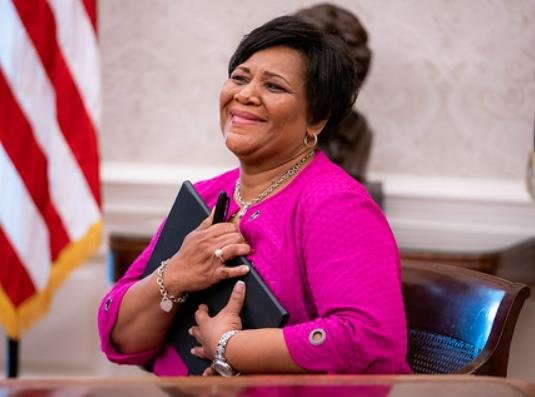Former President Donald Trump announced he would appoint Alice Marie Johnson, a woman he granted clemency during his first term, as his new “pardon czar.” The move, revealed during a Black History Month event, underscores Trump’s ongoing focus on criminal justice reform—an issue he championed during his presidency.
A New Role for a Familiar Face
Johnson, who once served a life sentence for a nonviolent drug offense, has become a key figure in the push for clemency reform. Trump commuted her sentence in 2018 and granted her a full pardon in 2020. Now, she’s being given the power to recommend others for similar relief.
Trump didn’t mince words when praising Johnson. “Alice was in prison for doing something that today probably wouldn’t even be prosecuted. She spent 22 years in prison,” he said. “She had another 22 years left. Can you believe it? And I pardoned her, and it was one of the best pardons.”
The specifics of the position remain unclear. Still, Trump suggested that Johnson’s role would involve identifying cases of excessive sentencing and making clemency recommendations. “She’s going to be my pardon czar. And you’re going to find people just like you… You’re going to look, and you’re going to make recommendations, and I’ll follow those recommendations for pardons,” Trump told Johnson at the event.

What Would a ‘Pardon Czar’ Do?
The U.S. president has the authority to grant pardons and commutations, but the process is typically handled by the Justice Department’s Office of the Pardon Attorney. Trump’s decision to create an independent position signals a potential shift away from bureaucratic channels.
- The term “pardon czar” is unofficial, and no formal job description exists.
- Johnson would likely work outside the Justice Department, bypassing traditional review processes.
- Her role would focus on reviewing clemency petitions and identifying candidates for Trump’s consideration.
While some view the appointment as a step toward more humane sentencing policies, others argue it could make clemency decisions more political.
Reaction from Criminal Justice Advocates
Johnson’s appointment has drawn praise from advocates who have long criticized the U.S. justice system for excessive sentencing and racial disparities.
Weldon Angelos, who also received a presidential pardon from Trump and later founded The Weldon Project, a nonprofit focused on criminal justice reform, voiced strong support. “Alice Johnson has been a relentless advocate for second chances, and her own story is a testament to the power of redemption,” he said.
“If she’s appointed as pardon czar, I believe she will bring compassion, experience, and a deep understanding of justice to the role. She knows the urgency of clemency and will work to ensure that more deserving people are reunited with their families.”
His sentiment reflects a broader push to reform the system, which critics say is riddled with inconsistencies and overly harsh punishments for nonviolent offenses.
Political Implications and Concerns
Johnson’s potential appointment also comes with political ramifications. Trump has repeatedly highlighted his record on criminal justice reform as he courts Black and Latino voters ahead of a possible 2024 rematch with President Joe Biden.
His signing of the First Step Act in 2018, which reduced mandatory minimum sentences and expanded early release programs, was widely seen as a rare bipartisan achievement. However, Trump has also ramped up his rhetoric on crime and punishment, calling for harsher penalties on certain offenses.
Some legal experts warn that giving a single individual such influence over pardons could raise ethical concerns. Traditionally, clemency decisions go through multiple levels of review to ensure fairness. Critics argue that a less formal process might lead to favoritism or politically motivated decisions.
On the other hand, Trump’s allies say the traditional process is too slow and often ignores deserving cases. Johnson herself has pushed for a faster, more transparent clemency system that prioritizes rehabilitation over punishment.
What Happens Next?
The White House has yet to comment on Trump’s announcement. Reports indicate that the role of “pardon czar” would be part of a broader plan if Trump were to return to office.
Johnson’s appointment would mark a significant shift in how presidential pardons are handled, potentially making clemency decisions more accessible to those who lack political connections or high-profile advocacy.
For now, the move adds another layer to Trump’s 2024 platform—one that highlights redemption and second chances, even as he leans into a tougher stance on crime overall.



